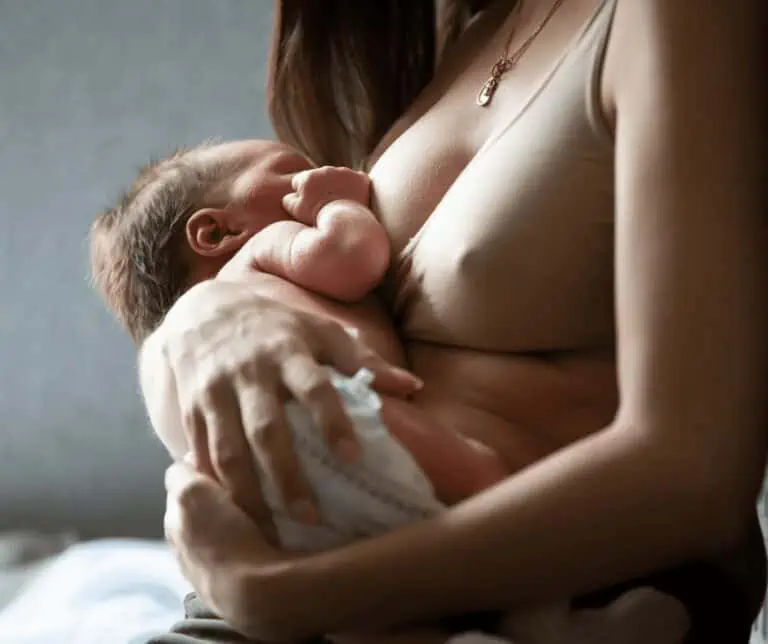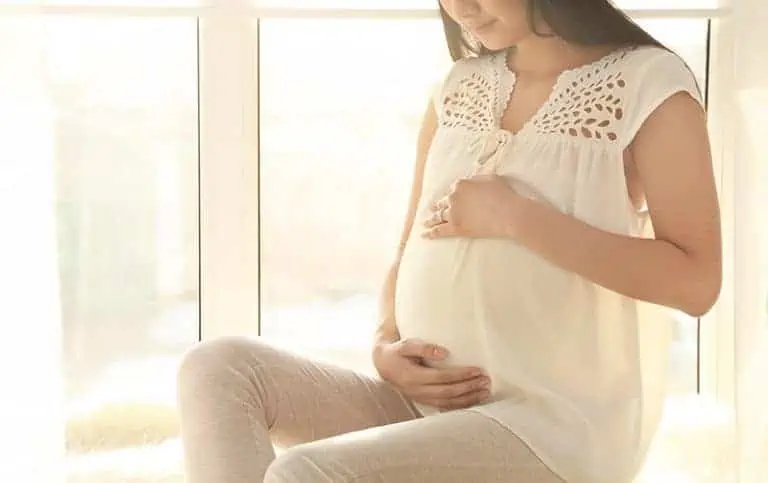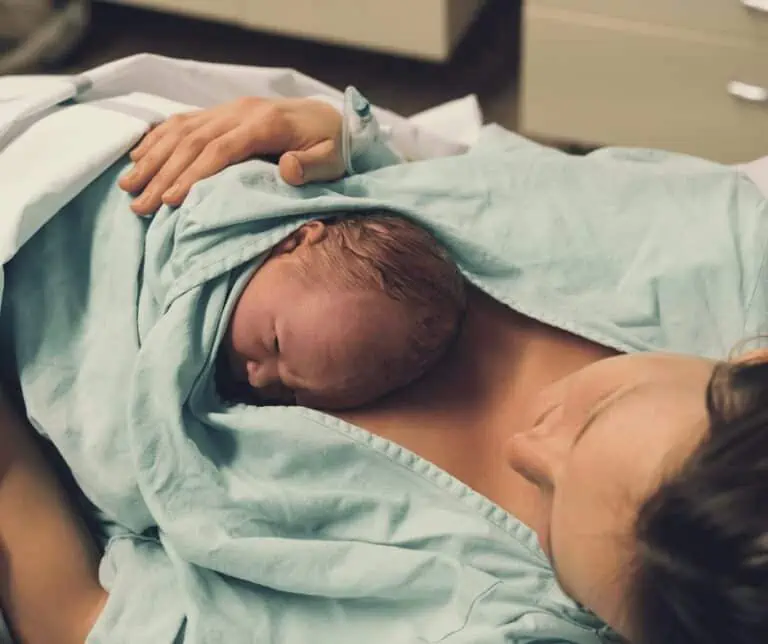Am I Ready for a Baby? 17 Questions to Consider
This post may contain affiliate links. As an Amazon Associate, I earn from qualifying purchases.
At some point in your life, if you’ve ever thought of having kids, the question might come up: Am I ready for a baby? There are many things to consider when considering starting a family.
This question hit me right before my 30th birthday, when I knew I wanted a few kids but didn’t know how long it’d take to start my family with my husband.
This article will cover 21 practical questions you should ask and answer (and discuss with your partner) before deciding to have kids. Let’s dive right in so you can gain some clarity.
Am I Ready for a Baby? Practical Considerations
First, let’s look at the practical side of things with these basic questions.

1. How will you get pregnant?
Firstly, it’s important that you understand how you get pregnant (at least to some extent). Having a basic understanding of when you ovulate, and giving your partner some tips, might be the first step in considering a baby.
If there are fertility issues or another route needs to be considered for pregnancy, consider what this will entail too.
2. Is your body ready for pregnancy?
It’s also important to consider if your body is ready for the changes that come with pregnancy. Talk to your doctor about any medications you are taking that aren’t safe for pregnancy. Plus, you’ll need to stop if you’re on birth control.
Also, discuss any concerns about chronic illnesses or medical history that might put your pregnancy at risk. You might want need to make some dietary changes too.
Related read: Fertility Diet Tips
3. Are you financially prepared for a baby?
This question doesn’t need much explanation- it’s important to consider if you can cover the basic costs of having a baby, including diapers, food, clothing, and healthcare. Although, don’t get too concerned about costs, as babies don’t have to be as expensive as everyone thinks if you approach raising a baby frugally.
4. Is your living situation okay for raising children?
Babies don’t need much but need a safe and clean environment as they start crawling and walking. On the other hand, it doesn’t need to be fancy (our family lived in a studio for almost 2 years with no problems).
Be honest with yourself if your living space can accommodate a baby. If not, consider what changes you need to make to provide your family a safe and secure place.
5. Does your insurance cover pregnancy and delivery?
It’s important to know the terms of your health insurance policy, particularly any coverage for pregnancy and delivery. Also, consider any extra costs associated with prenatal care or childbirth.
6. Do you have enough child care support?
As future parents, it’s also wise to consider who will help with childcare duties if both parents work full-time (grandparents, family, nanny, daycare, etc.).
Ensure you have strong support from close friends and family to help with childcare when needed. You may also change your mind about wanting to work after having a baby, so being prepared is important.
7. Will your job cover maternity leave?
If you are employed, make sure to check the job’s maternity leave policy. See if your job covers any type of parental leave and what other benefits they offer for new parents related to insurance, time off, child care, etc.
Am I Ready for a Baby? Lifestyle Considerations
Outside the more practical side, there are also some lifestyle and emotional considerations.

8. Are you ready to give up your current routine and flexibility?
Undoubtedly, having a baby significantly changes your life (although most parents admit it’s all worth it). Consider if you’re ready to give up the current routines, free time, and flexibility that comes with not having kids yet.
9. Are both partners emotionally ready?
Having a baby is an emotional roller coaster for both partners, so taking note of your mental health is crucial. It’s important to talk about how you will support each other through this life change. If you’re concerned about your mental health with a child, talk to a therapist, such as a licensed mental health counselor, about your choice.
Having emotional support from your partner and other people in your life is a very important part of your support system as a mom.
10. Can you accept the unpredictability of having a baby?
It’s important to realize that no one can predict how their baby will turn out or what kind of parenting style will work best. Prepare yourself mentally and emotionally to take each day as it comes with your bundle of joy.
11. Is your relationship ready for big changes?
Having a baby can put a lot of strain on relationships. It’s important to really communicate with each other about the changes that will come and build strong relationship foundations for when your little one arrives.
12. Will your partner step up to take on more responsibility?
As a mom, you’ll need to ask for more help with a newborn. Will your partner be up for the challenge? They will need to do a fair share at the beginning when both mom and baby need help to adjust.
Other Considerations
Here are a few more things to consider when it comes to having a baby.
13. Do you (we) really want kids?
It’s important that both partners want children and are ready. If one partner is more hesitant than the other, it’s often a sign to wait until they are both ready. Don’t feel pressured to have a baby if you’re not ready.
14. How will having a baby now impact your career/education?
It’s also important to consider if having a baby now will have an impact on either partner’s education or career plans. If so, it’s important to discuss this and come up with solutions if needed.
For example, when your baby is young or sick, one parent will need to have the flexibility to stay home (all the time or at least some of the time).
15. Will you and your partner agree on how to raise the child?
Finally, make sure to discuss any major parenting values and expectations beforehand. Ensure both partners are on the same page about issues such as discipline, education, and religious beliefs. Having a baby is an exciting yet daunting experience- preparing for the journey ahead is important!
Related read: Popular Parenting Styles in America
16. How will a baby affect your other important relationships?
Having a baby can also have an effect on your other relationships, such as friends, family, and coworkers. Make sure to discuss how you will manage these changes with the people in your life.
17. Are there things you still want to do before becoming a parent?
It’s also important to think about any goals or milestones you still want to accomplish before becoming a parent. Maybe there are places you want to travel, career ambitions you have yet to fulfill, or personal projects that need your attention. It’s wise to take care of these things before jumping into parenthood.
A Quick Overview
The real truth is that you likely won’t ever feel completely ready. You won’t know what becoming a parent is like until you actually become one. So here are some final quick considerations you can quickly review to get a sense:
- You aren’t considering a baby out of pressure or expectations from family members, friends, culture, etc.
- Your partner is on the same page as you and will be able to offer you emotional support
- You feel ready to face the unknown and confident to take on whatever comes your way
- You are okay with taking on extra responsibility and supporting the baby financially
- You have some type of support system in place for navigating motherhood (partner, friends, paid help, neighbors, etc.), which is so important for navigating postpartum depression and other possible complications
- You are ready for all of the roller coaster of parenthood, with so many wonderful things a new parent can look forward to
Feeling Anxious? Why You Don’t Need to Figure It All Out Quite Yet
You definitely don’t need all the answers, and some advice will tell you to have all your ducks in a row before having a baby, which is ridiculous. To be honest, even the best laid-out plans go out the window when a baby arrives.
- Don’t worry too much about whether you’re the “perfect age.” There is no such thing, and it’s up to you to decide when you’re ready, whether that is when you are younger or older.
- You don’t have to start taking baby classes or reading parenting books (you can save that for the end of pregnancy and beyond).
- You don’t have to choose baby names, a daycare, a pediatrician, a hospital, or anything else for a child that isn’t even conceived yet.
- Most of all, you do not need to worry about your child’s education and whether you’re in a good school district (I was surprised to see this recommended often).
Considerations If You’re Already Pregnant
If you’re already pregnant, congratulations! You can use the same considerations listed above to assess your readiness for parenthood. However, it’s important to be honest with yourself about any uncertainty and confusion about this new journey. Talk openly with your partner about any worries or anxieties you have and ensure you get the necessary resources and support.
For parents to be, read more here about how to prepare for your baby.
For Those Who Can’t/Don’t Want to Get Pregnant
If you’ve decided you want kids, but pregnancy isn’t in your cards for whatever reason (preference, health, fertility issues, etc.), you have many other options for your new family. These include:
- Surrogacy
- Adoption
- Foster care
- Using donor sperm or egg (if you want to get pregnant but don’t have a partner and will be a single parent)
- Fertility treatment
- Creating a blended family
The Bottom Line for the Parents to Be
There is no one-size-fits-all answer to the question of whether you should have a baby and when you’ll be ready to start raising children. Simply take time to reflect and discuss what feels right for you.
Ultimately, it’s a decision only you and your partner can make together. Take the time to consider all aspects of having a baby and make sure both partners are on the same page before taking the leap!
The fact that you’re taking having kids so seriously by reading this article is already a good sign that you’re going to be a great parent. Good luck!







